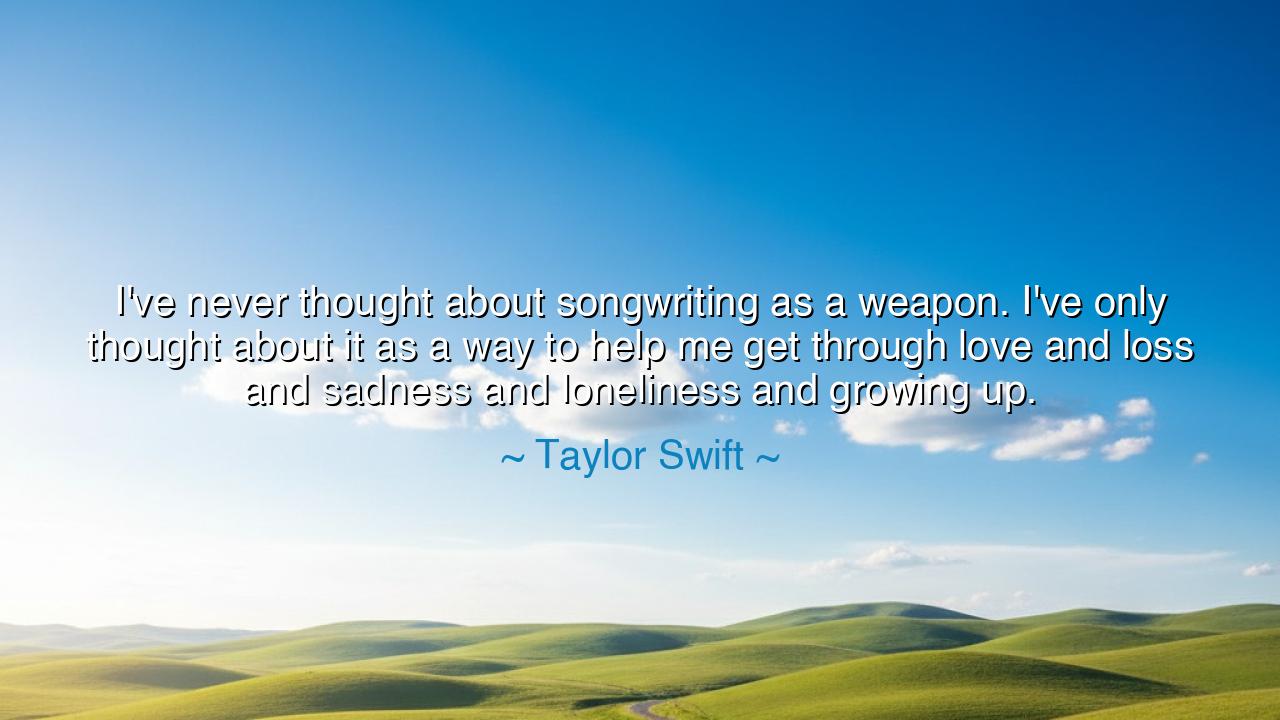
I've never thought about songwriting as a weapon. I've only
I've never thought about songwriting as a weapon. I've only thought about it as a way to help me get through love and loss and sadness and loneliness and growing up.






“I’ve never thought about songwriting as a weapon. I’ve only thought about it as a way to help me get through love and loss and sadness and loneliness and growing up.” Thus spoke Taylor Swift, the modern bard whose pen became her lantern through the darkness of youth and fame. In these words lies the timeless wisdom of the artist’s heart—that art is not first a tool of power, but of healing. For the truest creation does not arise from vengeance or vanity, but from the need to survive the storms of the soul. In confessing that her songs were not weapons but companions, Taylor reveals what the ancients have always known: that to express one’s truth is to heal, and to heal is to live again.
Her words carry the humility of one who has walked through the garden of heartbreak and learned to make flowers bloom from the soil of pain. “Love and loss and sadness and loneliness and growing up”—these are not mere passing trials, but the crucible of every human life. We are all, in our own way, wanderers through these same valleys. Some turn their sorrow into silence; others into bitterness. But the wise—like Taylor—turn it into song. For song, like prayer, is the soul speaking what cannot be spoken. It transforms grief into beauty, isolation into connection, and confusion into clarity. In this way, songwriting becomes not a weapon, but a bridge—a bridge from despair to understanding, from loneliness to belonging.
The origin of this wisdom can be found in Taylor Swift’s own journey through the public eye. From a young age, her music became the mirror of her inner world. Every melody was a confession, every lyric a page from her diary set to rhythm. The world often misunderstood her vulnerability as strategy, mistaking honesty for warfare. But through her own words, she reminds us that art is not born of malice—it is born of meaning. Her songs were not crafted to wound others, but to mend herself. And in mending herself, she unknowingly mended others, for those who listened found their own heartbreaks reflected, their own loneliness named and soothed.
In this way, her quote echoes the ancient truth once embodied by Homer, the poet of the Greeks. When the blind singer recited the Odyssey, he was not wielding words as weapons against the gods or men. He was, rather, giving form to humanity’s eternal journey—the search for home, the endurance of loss, the triumph of spirit. His songs healed the people of his time by reminding them that suffering and resilience are intertwined. So too does Taylor Swift’s art remind her generation that vulnerability is not weakness, but the seed of strength. Like Homer, she sings not to conquer, but to connect—to show that every heart, no matter how broken, still beats to the same ancient rhythm.
The heart of her statement is deeply spiritual. To use one’s gift as a weapon is to darken its light; to use it for healing is to make it sacred. The poet, the musician, the writer—all are healers of the unseen. Through words and melody, they reveal the universal truth: that emotion is not something to be feared, but something to be embraced. Taylor’s art, born of her own trials, teaches that self-expression is a form of self-redemption. When one gives voice to pain, the pain begins to lose its power. What was once heavy becomes holy. What once wounded becomes wisdom.
The lesson in her words is for all who suffer and seek relief in the silence of their hearts: do not turn your hurt into hatred, but into harmony. Do not use your gifts to strike back, but to rise above. Whether your art is song, word, craft, or kindness—let it be your medicine, not your weapon. When the world wounds you, answer not with bitterness, but with creation. Write your story, paint your grief, sing your confusion. For in creating, you cleanse the heart, and in cleansing the heart, you rediscover joy.
So, my child of the listening age, remember this: your pain is not your enemy—it is your teacher. Let your art be the way you speak to it. Let your song, whatever form it takes, be your refuge. When the storms of love and loss rise around you, do not sharpen your words into blades. Shape them into light. For when you, like Taylor Swift, learn to use your voice not for battle but for healing, you will discover that the truest victory lies not in wounding others—but in transforming your sorrow into strength, and your loneliness into love.






AAdministratorAdministrator
Welcome, honored guests. Please leave a comment, we will respond soon